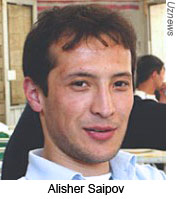New York, October 24, 2007—The Committee to Protect Journalists condemns today’s murder in southern Kyrgyzstan of Alisher Saipov, editor of the independent Uzbek-language weekly Siyosat (Politics)and contributor to several regional news outlets. Saipov was shot three times at a close range at around 7 p.m. in downtown Osh, a city bordering Uzbekistan, by an unknown gunman using a silencer, according to CPJ sources in the region. He died at the scene.
Saipov, 26, covered Uzbekistan’s political and social issues for Radio Free Free Europe/Radio Liberty, Voice of America, and the Central Asia news Web site Ferghana. He had interviewed members of the banned Islamic groups Hizb-ut Tahrir and the Islamic Movement of Uzbekistan, according to local CPJ sources. Exiled opposition activist Shakhida Yakub, who was close to Saipov, told The Associated Press that the journalist had recently become politically involved with Uzbek opposition groups.
“We are shocked and saddened by the brutal murder of Alisher Saipov and send our condolences to his family and friends,” CPJ Executive Director Joel Simon said. “Saipov reported extensively on repression in neighboring Uzbekistan and criticized Uzbek President Islam Karimov. The authorities in Kyrgyzstan must now launch a thorough and timely investigation into our colleague’s murder and bring those responsible to justice.”
An ethnic Uzbek, Saipov lived in and reported from the southern Kyrgyz city of Osh, just across the border from the Uzbek city of Andijan. Saipov covered the aftermath of mass killings in Andijan in May 2005, when government troops shot at crowds of civilians protesting Karimov’s regime. He reported on Uzbek refugees who fled and resettled in Kyrgyzstan. The Uzbek government put the Andijan death toll at 187; human rights groups say more than 700 were killed.
Prior to his murder, Saipov had received anonymous threats warning him to stop his press and political activities, a local source close to the journalist told CPJ. A state television channel in the Uzbek city of Namangan recently aired a program smearing Saipov as a provocateur who tried to destabilize Uzbekistan with his reporting. Several state publications ran similar articles, the same source told CPJ.
Following the Andijan killings, Uzbekistan has moved aggressively to expel, drive into exile, imprison, and harass independent jouranlsits, human rights defenders, opposition activists, representatives of international nongovernmental groups, and witnesses. Many found refuge in neighboring Kyrgyzstan, but Uzbek security services have infiltrated the area and continue harassing them there, according to human rights groups and local news reports. According to local press reports, Uzbek security agents have been spotted in the heavily ethnic-Uzbek city of Osh.
Saipov had helped scores of Uzbek refugees in southern Kyryzstan, assisting them with lodging and linking them with resettlement agencies, the AP said. He had also reported on the fate of Uzbek refugees in Iran for Ferghana, the news site said.
